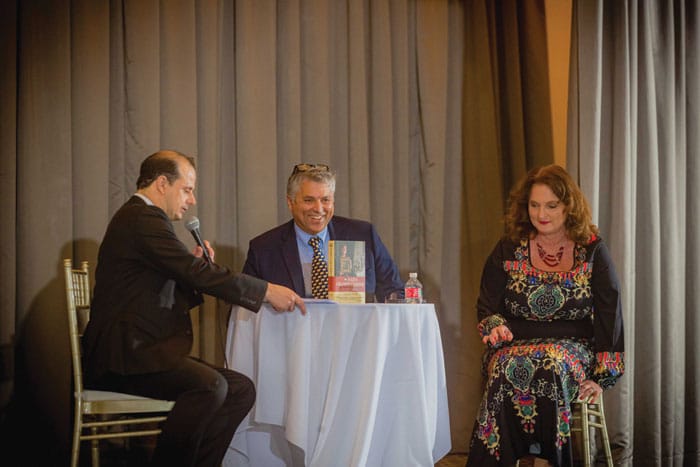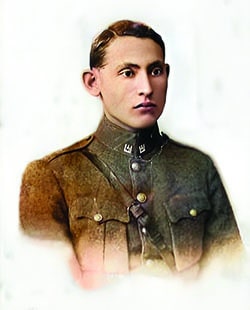 Dillon Hosier, CEO of ICAN, Grant Gochin, and Silvia Foti.
Dillon Hosier, CEO of ICAN, Grant Gochin, and Silvia Foti. Let there be no doubt about the central priorities in the intensely focused life of Grant Arthur Gochin, the honorary consul for the Republic of Togo and vice dean of the Los Angeles Consular Corps.
“Outside of my family, this is the most important thing in my world: educating about past genocides and preventing future genocides,” he said.
Gochin’s mission as a one-man, international human rights advocate began modestly.
His grandfather, Sam Gochin, “simply was the most decent human being who ever lived,” he said. Sam and Grant were quite close throughout Grant’s childhood and teen years.

Since the elder Gochin frequently alluded to the family’s Lithuanian roots, Grant fervently wanted to know more – not realizing how much of an impact it would have on his life.
By his 20s, “I wanted a formal tie with Lithuania,” said Grant. He had no idea, though, of the nightmarish stonewalling and lying that he would face ahead. Nor did Lithuania.
In 1990, the year Lithuania gained its freedom from the Soviet Union, he applied for citizenship.
“I was met with utter deception when they denied me,” he said.
The persistent 27-year-old applied twice more. “Again, I met absolute dishonesty,” he said. “I was informally advised that citizenship of Lithuania was not available for Jews. I sued the government of Lithuania five times and exposed their Judenrein citizenship policy. Citizenship was required before anyone could claim restitution. To ensure no Jews could, they would deny Jewish citizenship applications.”
When the restitution claim period ended, the Lithuanian legislature changed the law, making citizenship available for Jews, Gochin believes, in part because of his work.
“I urge every Litvak entitled to Lithuanian citizenship today to claim it,” he said.
It would be almost impossible to exaggerate how fond young Grant and his grandfather were of each other.
Growing up in South Africa, he’d often hear stories about Lithuania from his grandfather.
Lithuania was behind the Iron Curtain. No one was allowed in or out.
“He always said to me, ‘If, in your lifetime, you are ever able to go to Lithuania, you need to go and say Kaddish. You also need to go and look for anybody who survived,’” said Gochin “This was something he put on me before my bar mitzvah. It always was understood he would die before me, and that was the charge he was giving me.”
While his grandfather would show him photographs from the old days in Lithuania, he never told the boy what happened.
“I did not grow up knowing 100 members of my family had been killed by the Nazis,” Gochin said.
And recently, he made a startling discovery, surrounded by almost unbelievable irony.
“In 1984, the German magazine Der Spiegel published the story that one Jonas Noreika was the murderer [of my family] in the edition of April 22,1984,” Gochin said. “I worked in a bookstore in South Africa. That is why I remember the date so well.”
Since copies were shipped to South Africa by boat, the April edition would have gone on sale at the end of May.
“My grandfather, because of his Yiddish, always read Der Spiegel. He also read Newsweek and Time. And he read the newspaper every day.”
Gochin calculates that at the end of May 1984, his grandfather definitely would have picked up Der Spiegel. The inveterate reader would have seen the article revealing that his whole family had been murdered, at least 100, that there had been no survivors, and that the person who murdered them was Jonas Noreika.
Gochin believes his grandfather would have read thestory on May 30, May 31 or June 1.
Those dates are crucial, because his grandfather died on June 2, 38 years ago.
“He had a massive heart attack and dropped dead,” Gochin said. “I don’t know if Der Spiegel was in his hands at the time. But I assure you he had read that article in the day or two before he dropped dead.”
Gochin’s descriptive recollection of Sam’s death is memorable: “It was like cutting off an arm,” he said.
Five years later, the love and imagery of his grandfather as fresh as it is today, Gochin began his one-man drive to expose the truth about Lithuania’s murderous conduct throughout the Holocaust.
He did not dream how many continents he eventually would impact or how long his journey would be.
“My whole childhood I heard about the old country,” he said. “Remember, all of the adults had the old Yiddish accent. When I grew up, everybody around spoke in Yiddish.”
But with the grownups, Yiddish would pass away when they did.
“They would not let the children learn,” Gochin said. ‘That is the old language,’ they would say. ‘You learn English.’”
When Gochin reflects, the picture he sees is that “we were innocent, ignorant children. I wish I would have learned Yiddish from my grandfather.”
As Gochin looks back on his younger days, he said, “all they did was take the shtetl from Lithuania and move it to South Africa.”
In the separatist 1970s and ‘80s, the Jews were the Jews and the non-Jews were the non-Jews in apartheid South Africa.
“I was one of those ‘naughty’ children in South Africa, demonstrating, teaching literacy to Black kids, feeding Black kids in the ghettoes,” he said.
“I was one of those ‘naughty’ children in South Africa, demonstrating, teaching literacy to Black kids, feeding Black kids in the ghettoes.”
He called it “a response to my grandparents’ victimization. They trained us in South Africa not to let the Blacks be victimized the way they had been victimized. In Lithuania, they could not defend themselves. In South Africa, we could. My grandparents certainly were not going to tolerate racism. It was a requirement of us children that we stand against bigotry.”
Gochin, who came to the U.S. in 1986, declares publicly to international audiences that he will not be deterred in his campaign to reveal the truth about Nazis in Lithuania and elsewhere.
He mentioned Dr. Efraim Zuroff, director of the Simon Wiesenthal Center in Jerusalem, who exposed Lithuania’s “rampant heroization” of Lithuanian murderers.
“Lithuania made all forms of promises, and kept none,” said Gochin. “They waited for people to get bored with that story and move on. Their strategy was to delay and obstruct until people were so tired, they would go away. They have never told the truth.”
He has filed between 20 and 30 lawsuits against the Lithuanian government, which never have left the ground. He used to believe truth would triumph.
“When I discovered that the murderer of my own family was Jonas Noreika, I was still naïve,” said Gochin. “I thought that the Lithuanian government would rectify the situation based on facts. Clearly, I have failed. Their strategy was to obstruct, deny and delay. They even threatened me with criminal charges for exposing their history. The threats of criminal charges against me still stand.”
“As a proud Litvak, I will not stand by as our families are revictimized. They require the truth. I will fight to my last breath to ensure they have it.”
When Gochin realized that “truth was not a component of their consideration,” he set out to get “every possible department on record as a participant in this fraud.”
In the dozens of legal actions he has filed against Lithuania, he proudly asserts that he has “exposed” virtually every corner of the government, courts, Parliament, public prosecutors, the president and prime minister.
“All of them are involved in this coverup,” Gochin said.
While Lithuania’s historic denials have been internationally acknowledged, the country’s official, unswerving response has been: “No partisan ever murdered a Jew.”
The Lithuanian government officially has announced that Noreika was saving the Jews he was murdering.
“Their strategy here is to say they will examine these statements and respond,” Gochin said. “These are just delaying tactics while waiting for everyone to forget. My lawsuits prove they will not examine the facts and will not respond.”
Decades into his work, Gochin is stunned by his findings, which is news to most of the world.
“Noreika is just one of very many murderers Lithuania has converted into national heroes,” he said. “They do it openly, deliberately. We cannot change Lithuania’s conduct. Their Foreign Ministry stands in front of Jews and tells us how sad they are that their Jews were ‘lost.’
He continued, “As if the Jews wandered off into the forest and kindly Lithuanians are still looking for them. If Lithuania cannot find them, I suggest they find new Jews and issue citizenship to 220,000 Israelis of Litvak heritage.”
It should not be difficult, he said, since Spain and Portugal did it.
Gochin does not believe Lithuania wants to “find” lost Jews.
“There is a very easy path,” he said. “Unless they do this, I never want to hear their ‘lost Jews’ garbage again.”
While Gochin declared that his “agenda is to educate Jews,” he is busy on numerous international fronts, including the often overlooked African continent – and stimulating memory is one of primary goals.
He recalled that Hitler bragged since “no one remembers the Armenian genocide,” therefore he was free to kill Jews.
Often, Gochin audiences are hearing for the first time that today, now, genocides are going on in Cameroon, in DRC (Democratic Republic of the Congo), in Ethiopia and in Darfur.
As a Jew and as a native of the continent, Gochin is disturbed that people discount the African genocidal leaders.
“This is a bad mistake,” he said. “They are highly intelligent people. They look at something like Lithuania and say they can just rewrite history and get away with it because there are not so many cameras in Darfur filming the atrocities.”
He reported that 5 million people in Tigray are being starved to death, “a deliberate genocide. They say, ‘Israel doesn’t recognize the Armenian genocide, but that is for geopolitical reasons. Ukraine, Lithuania, Poland, Hungary – they are all Holocaust revisionists.”
More than 80 years have passed since the Holocaust softly began stepping into news reports.
“Do our families not ever deserve the truth?” Gochin said. “Lithuanian government officials say tthe murders were committed by Nazis and ‘criminals.’ They avoid using ‘Lithuanian criminals.’ One is just supposed to interpret that these were random criminals.”
In Gochin’s view, “according to the Nuremberg Laws, every single member of their provisional government should be listed as a Holocaust perpetrator,” he said.
“Our families were murdered. Lithuania did not punish one single murderer. Not one.”
He prefers bold language: “I ask for no assistance,” he sad. “I do not expect to succeed. Others did not, and neither will I.”
But that kind of realism does not slow Gochin.
“The genocide of our people was the most industrialized in the world,” he said. “But 50 million Chinese were murdered by Mao. Genocides are happening all over the world. It is a natural state of humans to kill anybody you oppose. If we are ever to stop these genocides, perpetrators need to know they will be held to account.”
He warned that Lithuania he is different from his fellow activists and difference-makers.
“I am young,” said Gochin. “I have time. We have truth and dignity. Each time they deceive, I re-focus. I will not go away. As a proud Litvak, I will not stand by as our families are revictimized. They require the truth. I will fight to my last breath to ensure they have it.”





















 More news and opinions than at a Shabbat dinner, right in your inbox.
More news and opinions than at a Shabbat dinner, right in your inbox.